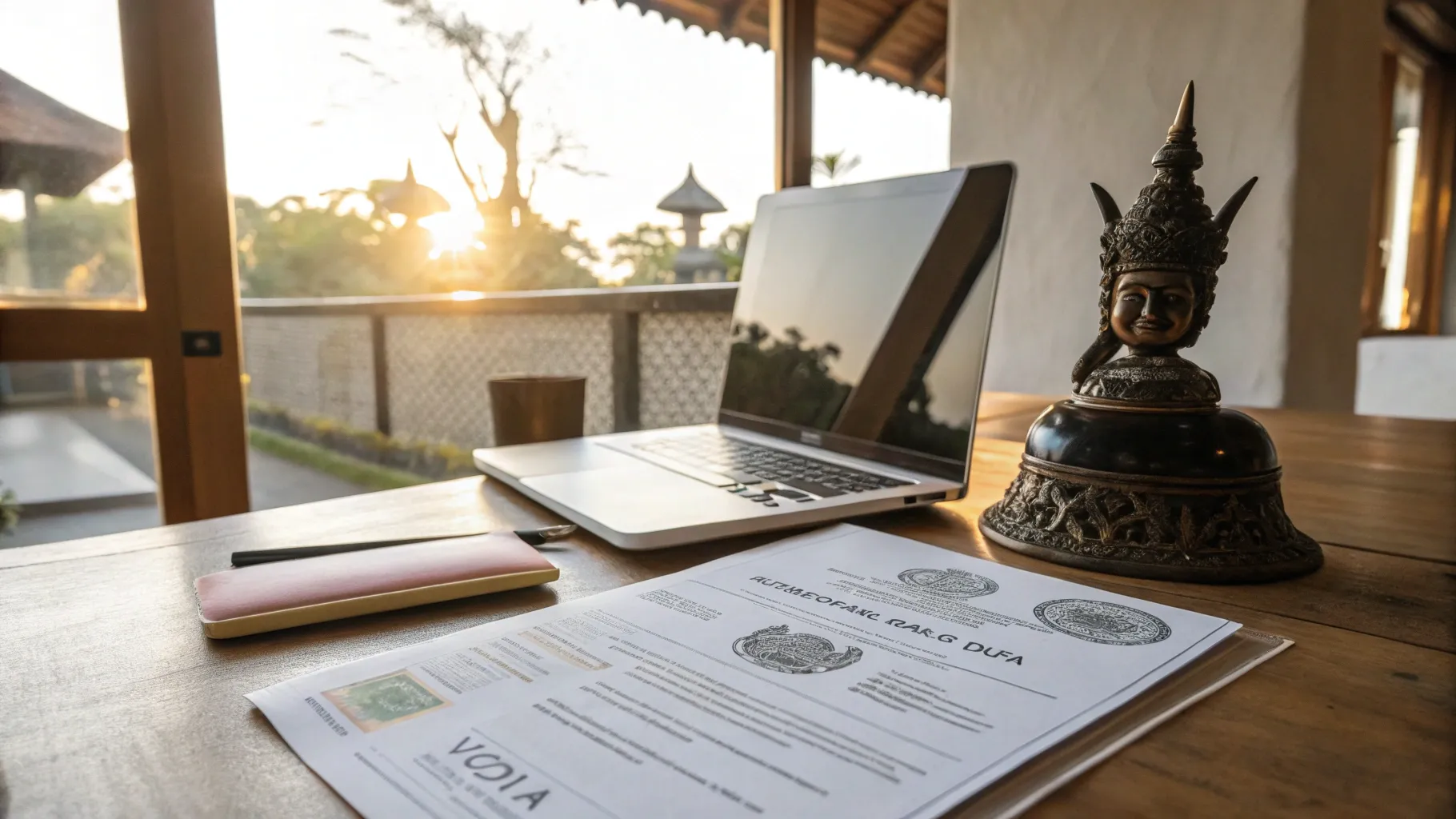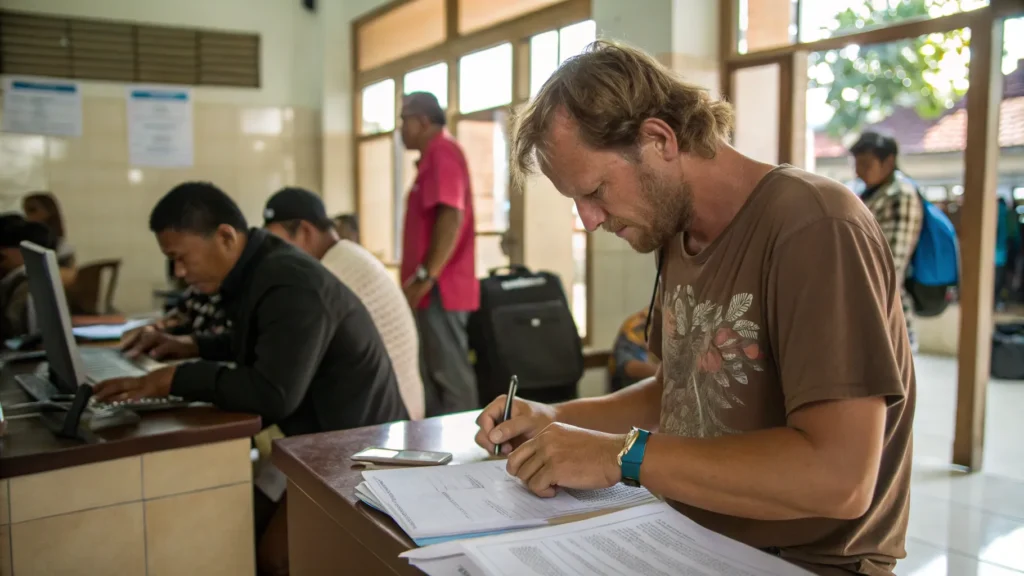Bali Visa FAQ 2026: Visa on Arrival, e-VOA, and New Tourist Tax Explained
anita ayu rustyaningtyas
August 26, 2025
22 min read

Planning a trip to Bali in 2026 but still puzzled about the visa rules? You’re not alone. Every year, travelers—from first-time backpackers to luxury holidaymakers—find themselves asking the same things: Do I need a visa for Bali? Which type should I apply for? Can I extend my stay if I fall in love with the island? That’s why we’ve put together this Bali visa FAQ 2026, so you’ll have all the essential answers in one place. From entry requirements and fees to extension tips and new regulations for 2026, this guide is designed to make your Bali travel experience smoother right from the moment you land at Ngurah Rai International Airport.
Bali visa requirements apply to all travelers regardless of age, explicitly including infants.
Bali Visa FAQs
Visa rules may not be the most exciting part of planning a holiday, but they’re one of the most important. In recent years, Indonesia has updated its entry policies several times, and 2026 brings a few changes every traveler should know—such as the new Bali tourist tax, digitalized e-VOA applications, and health-related entry requirements. This Bali visa FAQ 2026 has been compiled using the latest official information to help you understand which visa suits your trip, how much it will cost, and what to expect on arrival. With the right knowledge, you can step off the plane confident that your paperwork is in order and your focus can stay on enjoying Bali itself.
Please note: Indonesian citizens have different entry requirements than foreign nationals. This FAQ is focused on non-citizens visiting Bali.
Do I Need a Visa to Visit Bali in 2026?
Yes, most travelers visiting Bali will need a visa, though the type of visa you need depends on factors such as your nationality, length of stay, and the purpose of your visit. The most common visa options are the Bali visa on arrival (VoA Bali), the e-VOA (Electronic Visa on Arrival), and the Bali tourist visa.
The Visa on Arrival (VOA) is available for travelers from a number of eligible countries. This visa allows you to stay in Bali for up to 30 days, and it can be extended once for an additional 30 days, giving you a total of 60 days. The e-VOA offers a digital approach, allowing travelers to apply online before arrival, which helps expedite the entry process. It works the same way as the VOA, offering a 30-day stay, with the option to extend.
If you’re coming from a country that isn’t eligible for the Visa on Arrival (Bali visa free countries), you’ll need to apply for a Tourist Visa through an Indonesian embassy before your trip. Additionally, there are Social, Cultural, and Business Visas that may be required depending on the purpose of your visit.
For more detailed information on each visa type, visit the official Indonesian Immigration website, where you can find a full list of Indonesia visa requirements for Bali.
Why Do You Need a Visa for Bali in 2026?
In 2026, Bali continues to be one of the most sought-after destinations for tourists from around the world. However, to ensure a smooth and regulated flow of travelers, the Indonesian government requires most foreign visitors to obtain a visa. Having a visa helps ensure that your stay in Bali is legal and within the allowed timeframe, whether you’re here for leisure, business, or cultural exploration. A visa also provides necessary checks for entry, ensuring that travelers meet health, security, and tourism requirements. With a proper visa, you’ll also avoid overstaying and possible penalties, making it easier for you to enjoy Bali’s beauty without worries.
Travelers are responsible for ensuring they comply with all visa and entry requirements during their stay in Bali.
What Types of Visas Are Available for Bali in 2026?
In 2026, Indonesia offers several types of visas for travelers heading to Bali, catering to different purposes and durations of stay. Here are the main visa types you need to know about:
- Bali visa on arrival (VoA Bali): Ideal for tourists from eligible countries who plan to stay in Bali for up to 30 days. The Bali visa on arrival cost is IDR 500,000 (around USD 35), and it can be extended for an additional 30 days, giving you a total of 60 days in Bali.
- e-VOA (Electronic Visa on Arrival): The digital version of the Visa on Arrival, which allows you to apply for and receive your visa approval online before you even land in Bali. It’s perfect for those who want a hassle-free entry at the airport.
- Tourist Visa: If you’re from a country that’s not eligible for the VOA, or if you wish to stay longer, you can apply for a Tourist Visa through an Indonesian embassy. This visa often allows for stays of up to 60 days and may be extended.
- Business, Social, and Cultural Visas: These visas are for those visiting Bali for business, family, or cultural purposes. Each has its own set of requirements, including proof of invitation, business registration, or sponsorship from a local resident.
Choosing the right visa for your trip ensures that your stay in Bali is fully compliant with Indonesian immigration laws and regulations.
Read more: Understanding the Types of Indonesian Visas You Need to Know!
How to Apply for a Bali Visa Online in 2026?
Applying for a Bali visa online in 2026 has become more streamlined thanks to the e-VOA system. The process is straightforward and can save you time at the airport.
- Visit the Official Indonesian Visa Website: Go to the official government website for visa applications.
- Complete the Application Form: Fill out the online form with personal details, travel information, and passport details.
- Upload Required Documents: You’ll need to upload scanned copies of your passport (valid for at least 6 months), a passport-sized photo, and proof of travel (such as flight details or hotel booking).
- Pay the Visa Fee: The visa fee for the e-VOA is IDR 500,000 (around USD 35). Payment can be made online through the official portal using a valid credit card.
- Receive Your Visa: Once approved, you’ll receive your e-VOA via email, which you can print out and present upon arrival in Bali.
The process is quick, typically taking 3-5 business days for approval. Applying online ensures a smoother entry at Bali’s airport, as you won’t need to wait in long queues for visa processing.
How Long Does It Take to Get a Bali Visa?
The processing time for a Visa on Arrival (VOA) depends on whether you choose to apply for it online or at the airport:
- e-VOA (Online Visa): Once you submit your application online, it typically takes 3-5 business days to receive your approval. This method is faster and recommended for a smoother arrival process.
- VOA (On Arrival): If you choose to apply for the VOA when you arrive at the airport in Bali, the process can take anywhere from 20 minutes to an hour, depending on how busy immigration is.
For both options, it’s advised to apply for your Bali visa in advance to avoid delays, especially during peak travel seasons.
What Documents Are Required for a Bali Visa?
To apply for a Bali Visa, you will generally need the following documents:
- Valid Passport: Your passport must be valid for at least 6 months from the date of your arrival in Bali and have at least two blank pages for visa stamps. Travelers with biometric passports may be eligible to use e-Gates at immigration for faster processing.
- Passport-sized Photo: A recent photo of yourself (passport-style).
- Proof of Travel: This can include flight details showing your arrival and departure, or a hotel booking confirmation.
- Visa Payment: The visa fee is required to complete the application process (IDR 500,000 or approximately USD 35).
- Return or Onward Ticket: Immigration may ask for proof of your return flight or an onward ticket to ensure you’re not overstaying.
For the e-VOA, you will upload these documents through the online portal. If you’re applying for a tourist visa through an Indonesian embassy, additional documents such as financial statements or an invitation letter may be required depending on the type of visa.
Read more: How to Apply for an Indonesian Visa: Everything You Need to Know!
Do I Need to Show Financial Proof for My Bali Visa?
In most cases, travelers do not need to provide financial proof when applying for a Visa on Arrival (VoA Bali) or e-VOA. However, for certain visa types, especially long-term visa or business visas, you may need to provide evidence that you can financially support yourself during your stay.
Some of the documentation that may be requested includes:
- Bank statements showing a sufficient balance.
- Proof of employment or income (for business travelers).
It’s always a good idea to have a credit card or cash available to demonstrate that you can cover any additional expenses while in Bali.
What Are the Health and Safety Requirements for a Bali Visa?
As part of the visa process, travelers must meet certain health and safety requirements:
- Vaccination Proof: Depending on your country of origin, you may be required to show proof of certain vaccinations, such as COVID-19 (if still applicable) or yellow fever if you’re traveling from endemic regions.
- Health Declaration: You may need to complete an eHAC (Electronic Health Alert Card) form, providing details about your health status and travel history. This can usually be completed online before arrival.
- Medical Insurance: While not always required, it’s recommended that you carry adequate travel insurance to cover any potential health or safety emergencies while abroad. While medical treatment is available in Bali, it may be limited outside major cities, and serious cases may require evacuation.
Make sure to stay updated with any health-related travel requirements by checking official government resources or consulting with your embassy before traveling.
What is the Bali Visa on Arrival (VOA)?
The Visa on Arrival (VOA Bali) is a convenient option for many tourists, allowing them to obtain a visa upon their arrival at Bali’s airport. This visa costs IDR 500,000 (approximately USD 35), which can be paid either at the airport or online in advance. The Visa on Arrival is valid for a single entry into Indonesia.
Once you have the VOA, it’s valid for 30 days, and you can extend it once for an additional 30 days by visiting an immigration office in Bali. This gives you the flexibility to stay in Bali for up to 60 days if needed. For the visa extension process at the immigration office, you usually need to make an appointment in advance, as walk-ins are not always accepted.
The process for obtaining a Bali visa on arrival is relatively straightforward. You simply arrive at the airport, fill out a few forms, and make your payment. If you want to skip the line at the airport, you can apply for the e-VOA, which allows you to pay and receive your visa approval online before you even step foot in Bali, making your arrival smoother and faster.
Which Countries Can Get a Visa on Arrival to Bali?
The Visa on Arrival (VOA Bali) is available to travelers from many countries, including the United States, Canada, the United Kingdom, most EU countries, Australia, and Japan. However, travelers from certain countries—such as some African nations or countries on Indonesia’s visa blacklist—are not eligible for the VOA. These travelers will need to apply for a visa through the Indonesian embassy before their trip.
It’s important to check if your country is eligible for the VOA before making your travel arrangements. You can easily confirm this on the Indonesian Immigration website, which provides a full list of countries eligible for the VOA.
Read more: Bali Visa on Arrival Guide 2026: Requirements, Extensions, and Tips for a Smooth Entry
Can I Extend My Bali Visa on Arrival (VOA)?
Yes, you can extend Visa on Arrival (VOA) for an additional 30 days, allowing you to stay in Bali for up to 60 days. The process to extend your VOA is straightforward, but it’s essential to visit an immigration office in Bali before your visa expires to complete the extension.
You’ll need to provide your passport, a completed visa extension form, and payment for the extension. The fee for the extension is usually IDR 500,000 (around USD 35), but this could vary slightly depending on the location and time of extension.
It’s highly recommended to apply for your extension at least one week before your visa expires. This gives you enough time to handle any unexpected delays and ensures you don’t overstay your visa, which could lead to fines or other complications.
In addition to the in-person visit to the immigration office, the visa extension process is hybrid—you can fill out some forms online, and certain steps, like biometric verification, will be handled in person at the immigration office.
What is the Bali e-VOA (Electronic Visa on Arrival)?
The e-VOA is the digital version of the Visa on Arrival (VOA). It allows travelers to apply for their visa online before arriving in Bali, which can speed up the process upon arrival. The e-VOA costs the same as the regular VOA (IDR 500,000 or USD 35) and is valid for 30 days, with the option to extend it for another 30 days.
To apply for the e-VOA, simply visit the official Indonesian government website and complete the application form. You’ll need to upload a passport photo, proof of travel (such as flight details), and a few other documents. Once approved, the e-VOA will be sent to your email, and you can show it at the airport upon arrival.
Applying for the e-VOA is an efficient way to streamline your travel experience, allowing you to avoid long queues at immigration and gain entry faster.
Read more: e-Visa Indonesia: Everything You Need to Know Before Applying
Can I Extend My Bali Visa?
Yes, in most cases, you can extend your Bali visa. If you’re visiting Bali on a Visa on Arrival (VOA), it is possible to extend your stay for an additional 30 days, allowing you to stay in Bali for up to 60 days. For longer stays or other visa types, such as a Tourist Visa or Social Visa, you can also apply for an extension, depending on the specific visa requirements.
However, it’s important to note that extensions can only be done once for the Visa on Arrival. If you plan on staying longer than the extension period, you may need to leave Indonesia and reapply for a new visa or explore other visa options.
How to Extend Your Bali Visa in 2026
Extending your Bali visa in 2026 is a relatively straightforward process, but it requires you to act in advance. Here’s how you can extend your Visa on Arrival (VOA) or Tourist Visa:
- Visit an Immigration Office: To extend your visa, you must visit a local immigration office in Bali. It’s recommended to initiate the extension process at least one week before your visa expires to avoid penalties or overstaying.
- Submit the Required Documents: When you visit the immigration office, you’ll need to bring:
- Your passport (valid for at least 6 months from your arrival date)
- A completed extension form (available at the immigration office or online)
- A copy of your return flight or proof of onward travel.
- Pay the Extension Fee: The extension fee is IDR 500,000 (approximately $35 USD). This can be paid at the immigration office.
- Biometric Verification: If required, you will also undergo biometric verification at the immigration office as part of the extension process.
It typically takes 3–5 business days to process the extension. For more detailed assistance, you can use our Visa Extension Service for step-by-step guidance.
Read more: Visa Extension Indonesia: A Complete Guide to Staying Longer
How Long Can I Stay in Bali with a Tourist Visa?
If you enter Bali with a Tourist Visa, the maximum length of stay depends on the visa you apply for:
- Single Entry Tourist Visa: Typically valid for 60 days, and it may be extended for an additional 30 days after the initial period, allowing for a total stay of 90 days.
- Multiple Entry Tourist Visa: Available for travelers who plan to enter and exit Bali multiple times. This visa usually lasts for 6 months and allows for several entries, but you’ll need to leave and re-enter Indonesia periodically.
The duration of your stay is limited by the specific visa type and cannot be exceeded without proper extension or reapplication.
If you want to stay in Bali longer than the allowed visa period, you may need to leave the country and re-enter or apply for a different visa type. Always ensure you apply for an extension well before your visa expires.
What to Do If Your Bali Visa is Denied
A Bali visa denial can be frustrating, but it’s important to stay calm and understand the next steps:
- Ask for the Reason: If your visa application is denied, immigration officers will typically provide a reason for the denial. This could be due to incorrect or incomplete documentation, insufficient funds, or issues with your passport.
- Appeal the Decision: In some cases, you can appeal the decision by providing additional documentation or clarifying the reason for your denial. You may also request a review from higher immigration authorities.
- Consult with a Visa Expert: If you’re unsure why your visa was denied, consider consulting with a visa expert or immigration lawyer. They can help resolve any misunderstandings or errors in your application.
To avoid visa issues, make sure all documentation is correct, up to date, and meets the requirements outlined by Indonesian immigration. Before submitting your application, double-check that all visa requirements are satisfied to reduce the risk of denial.
How to Avoid Common Mistakes When Applying for a Bali Visa
The process of applying for a Bali visa can seem straightforward, but there are common mistakes that travelers often make. Here are some tips to help you avoid these pitfalls:
- Ensure Your Passport is Valid: Your passport must be valid for at least 6 months from your planned date of arrival in Bali. Make sure it’s up-to-date and has enough blank pages for visa stamps.
- Double-Check Documentation: Whether applying for a Visa on Arrival (VOA) or an e-VOA, ensure you have all the required documents, including your passport photo, proof of travel (flight booking), and payment receipt for visa fees.
- Apply for the Right Visa Type: Depending on your nationality and purpose of travel, ensure you’re applying for the correct visa type. If you’re unsure, consult with an expert to make sure you meet the requirements for a Tourist Visa, e-VOA, or Social Visa. When applying online, always confirm you are on the official visa application page and carefully follow any instructions if you encounter a website error or access issue.
- Don’t Wait Until the Last Minute: Apply for your visa well in advance. Immigration delays can occur, especially during peak travel seasons. It’s better to get your visa sorted out early to avoid complications.
By avoiding these common mistakes, you can ensure a smooth visa application process.
What is the New USD 10 Bali Tourist Levy?
Starting in 2026, Indonesia has introduced a USD10 tourist levy for all international visitors entering Bali. This levy is part of Indonesia’s efforts to manage tourism and fund sustainable development projects that preserve the environment and local culture.
- How Do I Pay the Tourist Levy? The tourist levy can be paid online when you apply for your visa, or you can pay it at the airport upon arrival.
- Who Needs to Pay? Every international tourist entering Bali is required to pay the tourist levy, regardless of whether you’re entering on a Visa on Arrival (VOA), e-VOA, or any other visa type.
- Purpose: The levy will help fund sustainable tourism projects, including efforts to preserve Bali’s natural resources, reduce environmental impact, and support local communities.
Be sure to check for updated payment methods on official websites and ensure you’ve accounted for the USD 10 levy when planning your budget.
What Are the Latest Rules for Tourists in Bali?
While Bali is known for its laid-back atmosphere, there are still important rules and cultural norms you should be aware of:
- Dress Code: When visiting temples and religious sites, dress modestly by covering your shoulders and knees. Beachwear should be reserved for the beach or pool only.
- Payments: While international credit cards are widely accepted, it’s always a good idea to carry some cash (Indonesian Rupiah) as smaller businesses may not accept cards.
- Respect Local Customs: Bali is a deeply spiritual place. Be respectful of local customs, such as not touching religious offerings or entering sacred spaces without permission.
Bali Visa Tips and Advice

Planning your trip to Bali? One of the first steps is ensuring you have the right visa to enter and stay in paradise. While the visa application process can be straightforward, navigating through the different options, requirements, and regulations can sometimes be overwhelming. Remember to protect your passport, personal information, and valuables during your stay in Bali to avoid any issues. But don’t worry – we’ve got you covered with these essential tips and advice to ensure a seamless visa experience, and how choosing the right visa concierge service, like Bali Premium Trip, can elevate your journey even further.
1. Start Your Visa Application Early
It’s always best to apply for your Bali visa well in advance of your trip. Whether you’re applying for a Visa on Arrival (VOA) or e-VOA, or planning for a longer stay with a Tourist Visa, submitting your application ahead of time ensures there are no delays or last-minute issues. Waiting until the last minute can lead to unnecessary stress, especially during peak tourist seasons.
2. Double-Check Your Documents
To avoid complications at immigration, always double-check that you have all the necessary documents ready. For a typical visa application, this includes your passport (valid for at least 6 months), passport-sized photos, flight details, and proof of accommodation. For certain visas, such as a Student Visa or Business Visa, you may need additional documents, like proof of enrollment or a letter of invitation.
3. Know Your Visa Type and Duration
Make sure you know the specific visa requirements that apply to your situation. If you’re only visiting for a short stay, the Visa on Arrival (VOA) might be the best option. It allows you to stay in Bali for up to 30 days, with a possible extension for another 30 days. However, if you plan to stay longer, you may need to opt for a Tourist Visa, which can be extended for up to 60 days.
4. Avoid Overstaying Your Visa
Overstaying your visa can lead to fines or, in the worst case, deportation. Travelers who overstay may also be detained by immigration authorities before being deported. It’s essential to be mindful of your visa’s expiration date and apply for an extension if needed. In most cases, extending a Visa on Arrival (VOA) can be done for another 30 days, but it’s important to initiate the extension process at least a week before your visa expires. Travelers who overstay their visa must pay a fine of IDR 1,000,000 per day.
5. Utilize Concierge Services for a Smooth Experience
While visas are essential, they are only one part of your Bali experience. At Bali Premium Trip, we provide a full suite of services designed to make your time in Bali effortless and luxurious. Not only can we assist with visa applications and immigration services, but our Visa concierge service is your personal travel assistant throughout your stay.
- Car Rentals and Private Transfers: From private Alphard transfers to luxury car rentals, we make transportation in Bali easy and comfortable.
- Luxury Tours and Premium Experiences: Looking for a more exclusive experience? We offer a range of premium Bali trips like private yacht charters, helicopter tours, and tailored excursions to Bali’s most iconic spots.
- Personalized Support: Whether you need help with booking exclusive restaurants, securing VIP airport fast-track services, or organizing special events like weddings or anniversaries, our team is here to take care of everything. If needed, our concierge can also help you connect with local authorities or emergency services during your stay.
By choosing Bali Premium Trip, you’re not just getting help with your visa and immigration – you’re getting a trusted partner who can handle all your travel needs, ensuring that your time in Bali is both stress-free and unforgettable.
6. Stay Informed About Bali’s Visa Rules
Visa rules can change, so it’s essential to stay informed about any updates or new regulations. For instance, tourist taxes like the $10 Bali tourist levy were recently introduced, and staying up to date ensures that you’re never caught off guard by new policies.
Travelers should also stay informed about any travel restrictions or advisories that may affect movement within Indonesia, especially in certain regions.
At Bali Premium Trip, we monitor any changes to visa and entry requirements so you don’t have to. When you use our Visa Concierge Service, we keep you updated on all necessary changes, giving you peace of mind throughout your trip.
Apply for Your Visa with Bali Premium Trip
Navigating Bali’s visa process doesn’t have to be complicated. With Visa Concierge Service by Bali Premium Trip, you can leave the logistics to us and focus on enjoying your dream vacation. Whether you need assistance with visa applications, extensions, or any travel arrangements, our dedicated team is here to support you every step of the way.
From smooth visa processing to luxury experiences in Bali, we’re more than just a service provider – we’re your trusted travel companion. Let us take care of the details, so you can enjoy the best that Bali has to offer.
Contact us today to learn more about how we can assist with your visa needs and beyond. With Bali Premium Trip, your Bali adventure starts with ease and comfort.

Related Article
A Discreet 48-Hour Private Relocation from the Gulf to Bali
Bali, with its stunning natural beauty, rich culture, relaxed lifestyle,...
Bali, with its stunning natural beauty, rich culture, relaxed lifestyle, and safety, is becoming an increasingly popular choice for those...
Relocation from Dubai to Bali: The Ultimate Family Guide to Move Securely and Comfortably
Recent operational disruptions announced by Dubai Airports include suspension at...
Recent operational disruptions announced by Dubai Airports include suspension at Dubai International Airport (DXB) and Al Maktoum International Airport (DWC)....
The Ultimate Bali to Komodo Island Private Superyacht Charter: An Elite Concierge Guide
BALI, INDONESIA — At Bali Premium Trip, our high-end concierge...
BALI, INDONESIA — At Bali Premium Trip, our high-end concierge desk caters to the most exclusive travel requests across the...



